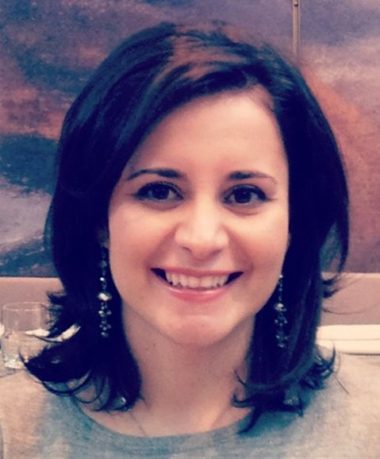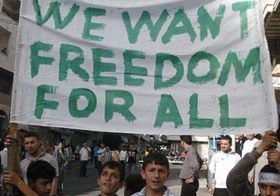On the anniversary of the Syrian uprisings, Assistant Professor Haya Ajjan in the Love School of Business reflects on her Syrian-American heritage.

*****
The following column appeared over the weekend of March 17-18, 2012, in the Charlotte Observer and the (Burlington, N.C.) Times-News.
*****
In support of Syria, a new pride emerges
By Haya Ajjan – hajjan@elon.edu
When I moved to North Carolina from Syria as a teenager, I adopted an American identity as I sought new friends and a place to belong. In fact, I found I was slowly denying my Syrian heritage as I discovered in the United States a nation that respects human rights and respects human dignity.
Seeing a country that respects its people and gives them freedom of speech makes it hard to take pride in a country that doesn’t.
Not long after the Arab Spring uprisings advanced to Syria, and peaceful demonstrators were detained, tortured, and killed, I glued myself to Facebook and YouTube to follow news from communities I once called home. Every time I read stories of countrymen tortured and killed, my Syrian identity, once buried in the deepest recesses of an adolescent mind, awakened.

I suddenly felt privileged to have come from people who were not afraid to pay the price of freedom.
The regime of Syrian President Bashar al-Assad is holding the Syrian people hostage. Syrians around the world are afraid to voice their opinion against the regime out of fear of reprisal against their families still there.
The Arab Spring is not a desire to change dictators; it is the desire to reclaim dignity, life and freedom. Imagine living life in the shadow and suddenly seeing the sun, wondering how you ever lived without it. That was how my cousin in Damascus described marching into the streets of his neighborhood as he chanted for freedom, dignity and a united democratic nation.
Something he said still inspires me. The power and the will of the people, my cousin explained, are much stronger than the fear of death.
Thousands of Syrians, mostly civilians, have been killed by security forces, a number roughly five times that of those killed when NATO intervened to save the Libyans from the Gadhafi regime.
As torture and murder intensified, the will of the people grew stronger, and their chanting grew louder as they marched in the ancient Roman alleys of Homs, Damascus, Daraa, Idlib, Dir El Zour, and many other cities. Today the carnage continues and has worsened, entire cities like Homs, Hama, and Daraa are under military occupation, electricity is often shut down, and food and water have become scarce. Physicians are threatened and sometimes killed for treating the wounded.

Accounts from activists inside Syria confirmed that Assad’s security forces are executing injured protestors admitted to hospitals for treatment and that civilians are shot by snipers when pulling the bodies of protestors from the streets in order to save the injured or bury the dead. The United Nations described in a recent report what is happening in Syria as “crimes against humanity”.
Some people are fleeing to Turkey, Jordan, and Lebanon to escape the threat of torture or death. Nearly 20,000 Syrians are living in tents in frigid conditions with little support from the international community, except for few humanitarian organizations like the Red Crescent and Human Rights Watch.
Many around the world are concerned about who will lead Syria after the Assad regime. For many years I was a hostage of the Assad propaganda and believed that we would have but two choices: Islamists or chaos. This uprising proved me wrong. Insurgent leaders have demonstrated how Syria has the power to rebuild its infrastructure and create a new democracy where all people can prosper and succeed.
Since the Syrian uprising began on March 15, 2011, I have come to understand how my life is no longer about living the American dream with a family, a house and a rewarding career. Life now is about supporting the courage and persistence of the Syrian people and doing all that I can to help them prevail.
Syrians have reached the point of no return, and the longer the international community waits to intervene the worst the humanitarian situation will become. Telling these stories is my way to resist the brutal Assad dictatorship and promote democracy in a part of the world I again think of as “home.”
******
Elon University faculty with an interest in sharing their expertise with wider audiences are encouraged to contact Eric Townsend (etownsend4@elon.edu) in the Office of University Communications should they like assistance with prospective newspaper op/ed submissions.


